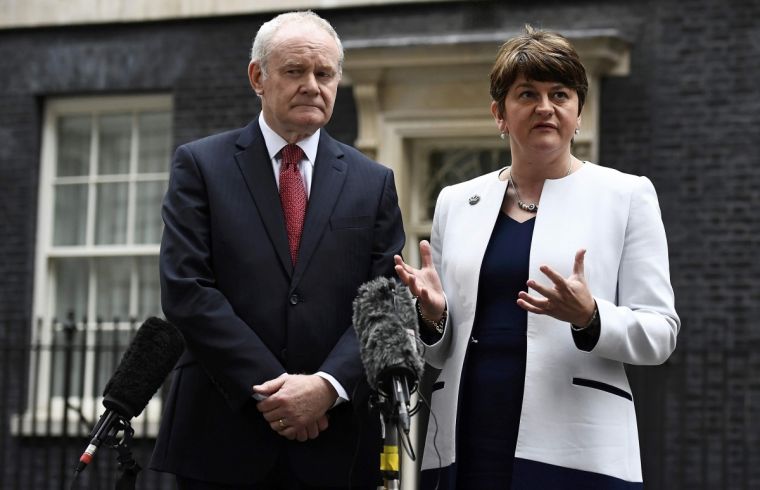Northern Ireland Faces Elections As McGuinness Quits Over 'Cash For Ash'

Northern Ireland's deputy leader, Martin McGuinness, resigned on Monday in protest at First Minister Arlene Foster's handling of a controversial green energy scheme, a move likely to trigger an election in the province.
The collapse of the relationship between Irish nationalist leader McGuinness and Foster risks paralysing the region's response to Britain's planned exit from the European Union as London prepares to trigger divorce talks.
McGuinness also raised the prospect of a lengthy renegotiation of the terms of power-sharing, part of the 1998 Good Friday peace agreement, saying there would be "no return to the status quo" after an election.
"Sinn Fein will not tolerate the arrogance of Arlene Foster and the DUP (Democratic Unionist Party). We now need an election to allow the people to make their own judgment," he said.
The 1998 deal ended three decades of violence between mainly Catholic Irish nationalists seeking a united Ireland and Protestant pro-British unionists who wanted the North to remain part of the United Kingdom.
While the violence, which killed over 3,600, has subsided, the two sides of the sectarian divide have consistently strained at the confines of their power-sharing arrangement.
"Cash for ash"
McGuinness said in a statement that he was quitting because Foster had repeatedly refused to step aside for the duration of an inquiry into the botched "cash for ash" scheme, which she established when she was enterprise minister.
The scheme aimed to encourage businesses to burn wood pellets rather than fossil fuels. The failure to put a cap on the rebate, worth £1.60 for every £1 spent, could cost Northern Ireland up to £490 million, Sinn Fein says.
Foster says she closed it down as soon as the potential abuse was recognised.
But Sinn Fein said this was just the latest example of Foster's DUP failing to treat Sinn Fein with "equality and respect" in recent months.
Sinn Fein, which campaigned for the UK to stay in the European Union, says Foster has failed to properly represent the 56 percent of Northern Ireland voters who voted "Remain".
Foster, who campaigned to quit the EU, said she must instead respect the opinion of the 52 per cent of UK voters who wanted to leave.
Checkpoints ahead?
Northern Ireland is widely seen as the part of the UK most exposed to Brexit because of the prospect that checkpoints will be reinstated on its land border with the Irish Republic.
But while Scottish First Minister Nicola Sturgeon has vocally defended her nation's interests with regard to Brexit negotiations, the government in Belfast has been relatively quiet.
McGuinness said Sinn Fein would not nominate anyone to fill his role, which will cause the power-sharing government to collapse after seven days. It would then be up to London's Northern Ireland secretary, James Brokenshire, to propose a date for the election.
Foster said in a statement that she was disappointed by McGuinness's action, which was "not principled".
It was not clear if McGuinness, who has recently taken a break from some of his duties because of an undisclosed illness, would lead Sinn Fein into the election.
He told journalists he would say at a later date whether or not he would be well enough to stand, but said his health had nothing to do with his decision to step down.











